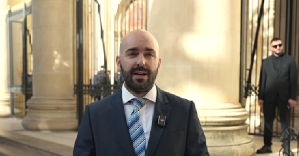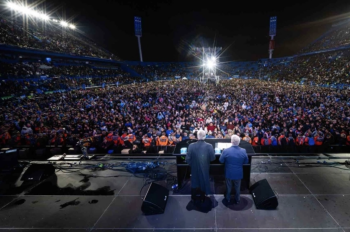
Prior to postponement of a court ruling in a Christian’s three-year legal struggle against charges of promoting sexual orientation “conversion therapy,” the formerly gay man in Malta stated that Christians around the world could face similar ordeals.
“Anyone who cares about freedom of speech should feel alarmed by what is happening to me,” Matthew Grech stated on Facebook. “If it happens to me in Malta, I assure you that it will soon be happening in the U.K. and other countries across the world.”
Grech, a former reality TV singing contestant who left a gay lifestyle to follow Christ and became targeted by Malta’s prosecutor for allegedly supporting sexual orientation conversion practices, could face five months in jail if guilty.
Grech was due to appear in court in the island capital of Valletta on Thursday (Nov. 6), but the judge did not hand down an expected verdict, according to rights group Christian Concern. The delayed verdict follows more than three years of legal uncertainty, the group stated.
In 2016 Malta became the first country in the European Union to ban what LGBTQI+ lobbies describe as “conversion therapy,” according to Christian Concern. Grech, a church worker, faces prosecution under Malta’s Affirmation of Sexual Orientation, Gender and Gender Expression Act for allegedly “advertising conversion practices.”
The charges stem from a 2022 interview on PMnews Malta, a free-speech media platform, where Grech shared his testimony of becoming a born-again Christian and voluntarily leaving behind a homosexual lifestyle, according to the group.
Grech’s attorneys assert the charges violate his fundamental rights under Article 41 of the Constitution of Malta and Article 10 of the European Convention on Human Rights. His defense team maintains that Grech expressed a personal faith and identity in the interview, not an advertisement for therapy.
Christian Concern stated that Grech spoke about his personal faith in the interview but did not promote or offer therapy. Presenters on the media outlet, who also face prosecution, asked Grech about his views on the “conversion therapy” that Malta bans.
Grech responded by sharing his own experience. He referenced scientific perspectives about addressing trauma by utilizing “talking therapy,” which can “sometimes reduce same-sex attraction and gender confusion,” Christian Concern stated.
Grech reportedly dismissed the term “conversion therapy” and explained his perspective of biblical faith.
“I understood that in the Bible, homosexuality is not an identity as we make it nowadays,” Grech reportedly said. “And neither is it a feeling, but a practice. This means that no matter what sexual feelings a man or a woman experiences, if they have sexual relations with a person of the same sex, they commit the homosexual act in God’s eyes, and that is a sin.”
He stated that, as with any other sin, one can repent of it, ask God for forgiveness and ask Him for strength to overcome, adding, “I’m talking here from a Christian perspective.”
The program introduced him as a representative of the International Federation for Therapeutic and Counselling Choice (IFTCC). Mike Davidson, founder of IFTCC and Core Issues Trust, testified in Grech’s defense at the last hearing. He clarified that Grech had never undergone therapy related to his sexuality and was not an insider to such practices, according to Christian Concern.
“The freedoms of speech, conscience and religion are being attacked,” Davidson said at the hearing, according to Christian Concern. “The fact is that therapeutic and counselling choice is a fundamental right. Governments promoting monocultural viewpoints – this idea that sexual orientation is inborn and unchangeable, and that gender is unrelated to biological sex – are denying those unwilling to identify as LGBT the right to leave identities and practices no longer relevant to them. This is a human rights issue.”
Silvan Agius, an LGBTQI+ activist and senior European Union equality official, filed the police report accusing Grech of unlawfully advertising “conversion practices,” the group reported. Agius, who serves in the cabinet of EU Commissioner for Equality Helena Dalli and was instrumental in Malta’s 2016 ban on conversion therapy, filed the complaint alongside activists Cynthia Chircop and Christian Attard.
In a recent statement outside court, Andrea Williams, chief executive of the Christian Legal Centre, said prosecutors had failed to define “conversion therapy” and said the state deliberately targeted Grech for his Christian beliefs on human sexuality.
“It is deeply unjust that they have criminalized Matthew for so long, simply for sharing his personal testimony,” Williams said. “In an online interview in Malta, he spoke to a small audience about his joyful conversion to Christ, his voluntary decision to leave behind a homosexual lifestyle.”
He also responded openly to journalists’ questions about the efficacy and safety of therapy, she said.
“The real threat here is not just to Matthew, but to freedom of speech itself,” Williams said. “Even the broadcasters, who sympathized with LGBT perspectives and openly challenged Matthew in the discussion, have faced prosecution. That is absurd. For Matthew’s sake, for Malta’s sake and for the sake of free speech worldwide, I hope the court will acquit him now that it has fully heard the evidence.”
Grech became a Christian after pursuing an ambition to become a master in Reiki with the purpose of transmitting healing energy. He moved to London at age 19 to attend the “College of Light” and become familiar with “ki” energy. A Christian friend of his father, however, warned him that the practice was part of the occult.
“The rest of the students described energy wheels that they saw in the spirit. I was the only one who didn’t see anything,” Grech said in a 2019 interview with this reporter. “I was disappointed, and I was left very hungry for the supernatural. But when I met the first Christian woman who evangelized to me, she warned me that not all energy comes from God, and that I had to start exercising discernment. That’s when I was led to a church and gave my life to Jesus, the ultimate healer.”
Brought up a traditional Roman Catholic, Grech grew up in a stable family home on Malta, and his grandmother handed him written prayers to recite, some of which invoked the Holy Spirit.
“I used to love her devotion and piety,” he recalled. “Growing up in a males-only secondary school, I was musically inclined. Most of my friends were into sports, and I found it hard to fit in. I would hide away and get lost in my own imaginary world. I had one friend who was into DJ-ing, and that brought me consolation. Finally – a friend who understood me!”
At age 11, Grech discovered pornography on the internet and TV, as well as books with graphic images in the local school library. He soon became addicted to such material as he moved into his teens.
“I experienced considerable peer pressure from close friends when I was 14 – I would hang out with girls and date them to try and fit in,” he said. “I tried hard to be a normal teenage boy, but I caught myself fantasizing about guys.”
Friends made jokes about him being gay and attracted to boys, he said.
“Doubt and insecurity began to define me, to a point where I began to doubt my sexuality – could this be true?” Grech said. “Did I end up sexualizing my unmet need to bond with persons of the same gender? Were there other factors in my upbringing that led me to believe that I was a lesser male?”
At about the same time he began engaging in homosexual acts, Grech found he was skilled in singing and playing the piano. Music became a means of escape where he could “dream big and come out of my bleak reality for a while.”
“I developed my talent, and recorded my own music, aged 16,” he added. “Little did I know that the local radio stations would find my music appealing.”
The young singer received nominations at the Malta Music Awards and Bay Music Awards in 2006-2008, as Best Newcomer, Best Solo Artist and Best Male Artist.
“I hid behind my alter ego, Jay Omaro, my stage name at the time. It felt so good to be appreciated, valued and highly esteemed,” he said, but after growing tired of “living for the weekend,” he found himself at a prayer meeting in a rented school hall.
“I encountered a family of believers that freely worshiped and prayed to a God that was present for them in the room, and a God they knew personally,” he said. “It was authentic – it felt alive. I was drawn to their prayer language and the seamless fruit of their life. I loved their diligence in bringing the Bible with them to church.”
Grech later attended a church service and received a supernatural healing from a migraine, he said.
“I was powerfully touched by the Holy Spirit before Communion as I knelt down, and knew that my life was being shaken for the better,” Grech said. “I bought my first Bible and lived with an intense daily longing for more of God and His ways.”
In his personal journey of Bible reading, God revealed his sin, and he felt godly sorrow for being a sinner, he said.
“I was taught that if I believed that Jesus is the Son of God and made Him Lord over my life, I could seal my commitment to follow Him through the rite of baptism,” he said. “I fully surrendered my life to the Lord.”
Grech, whose story became the subject of a documentary film called “Once Gay” in February 2019, believes that people have a basic human right to walk away from a homosexual lifestyle that the wider community should respect. This belief has brought criticism from some people in the gay community, as well as from Maltese politicians.
Still, Grech said his heart is to know Jesus more and to share the love of God with others, whatever their background.
“Now I know Jesus is alive, that He loves all sinners, and that He is calling them unto repentance for the gift of eternal life,” Grech said.





